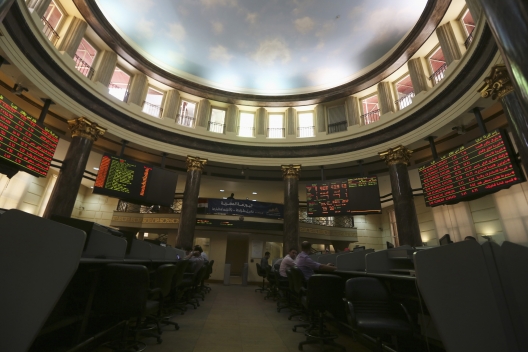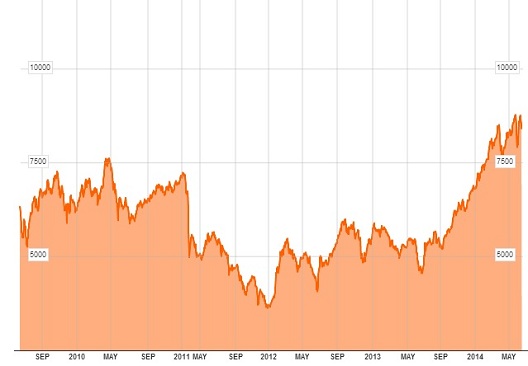 The Egyptian economy has been slumping for the past three years. Since January 2011 economic growth has come down substantially, unemployment has been steadily rising, inflation has remained high, the fiscal deficit has expanded, and the foreign exchange reserves of the country have fallen by more than half. Clearly this is a grim picture that compares unfavorably on all accounts with the performance of the Egyptian economy during the last years of the Hosni Mubarak regime.
The Egyptian economy has been slumping for the past three years. Since January 2011 economic growth has come down substantially, unemployment has been steadily rising, inflation has remained high, the fiscal deficit has expanded, and the foreign exchange reserves of the country have fallen by more than half. Clearly this is a grim picture that compares unfavorably on all accounts with the performance of the Egyptian economy during the last years of the Hosni Mubarak regime.
However, amidst this otherwise gloomy situation, the one bright spot has been the Egyptian stock market, which has seen a spectacular rise since the fall of Mohamed Morsi’s government in July 2013. The most watched index—EGX30—rose from 4,971 on July 3, 2013 to 8,396 on June 17, 2014, an increase of nearly 70 percent and making the Egyptian Stock Market one of the best performing stock markets in the world.
At the start of the uprising in 2011, stock prices collapsed and the market lost $12 billion in just two days. The market was then closed for two months until March 23, 2011 and after it opened, it continued to fall steadily through 2011 and 2012. During June 2013, as protests against Morsi spread, the EGX30 index dropped by 17 percent and then jumped back up by 7 percent on the day after the government was removed. Since then, despite some short-term volatility, the stock market has risen steadily, eventually surpassing the level it reached in December 2010 just prior to the uprising.

EGX30 Trend 2010 – 2014 (Source: Bloomberg)
This year the EGX30 index has risen by 23 percent, and in fact crossed the 8,700 point barrier—the highest level reached since August 10, 2008. The decline in EGX30 following the June announcement of the extension of the capital gains tax to stock market capital gains and dividends, was largely offset by Morgan Stanley’s decision to keep the Egyptian Stock Exchange in the Emerging Markets Index (MSCI). More than EGP 5 billion of capital was raised in the market during the first half of 2014 and for the first time since 2010, two Initial Public Offerings (IPOs)—for the Arabian Cement Company and Arabtec Construction LLC—were completed in May and June,
Obviously, there is some disconnect between so-called economic fundamentals, as represented by the main macroeconomic indicators, and the behavior of the stock market. Why is the economy floundering but the stock market booming? There are two main explanations for this phenomenon.
First, the economy is flush with liquidity as the fiscal deficit and the government’s borrowing needs have grown substantially. The expansionary fiscal policy has pumped liquidity into the system. With real investment and economic activity at a virtual standstill, this liquidity has to find a home and the stock market is where it has gone. Furthermore, capital controls imposed by the Central Bank of Egypt to restrict the outflow of capital in order to preserve the country’s foreign exchange reserves has kept this liquidity from escaping abroad. There is some validity to this explanation, although it is by no means the full story. After all, there was excess liquidity in the system as well as capital controls in the period prior to the fall of the Morsi government and yet the stock market fell consistently during 2012 until mid-2013. There has to be something else.
Second, and perhaps the more important explanation, is that expectations for the outlook of the Egyptian economy have changed in a very positive way over the last year. Stock market prices reflect expectations of future economic performance and investors apparently now see a turnaround in the Egyptian economy. This optimism is supported by surveys of Egyptian businessmen who expect a significant improvement in the economy from 2014 on. Furthermore, a Reuters poll of investment funds in the Middle East showed that over half of these funds were ready to increase their investments in the Egyptian stock market in 2014.
Certainly the $12 billion in assistance provided by Kuwait, Saudi Arabia, and the United Arab Emirates, as well promises of future aid, had a lot to do with changing investors’ views about the outlook for the Egyptian economy. In fact, it was this external assistance that largely led to Fitch raising Egypt’s credit rating from negative to stable this past January.
In sum, all is not gloom and doom on the economic front in Egypt. What President Abdel Fattah al-Sisi and his government need to do is to build on the positive stock market expectations by turning the macroeconomic indicators around quickly. Foreign and domestic investors appear to be waiting for the right time and the right policies to start investing in Egypt. It is now up to the new government to create the right conditions for them to do so. If it succeeds in this, the turnaround in the economy could come fairly soon.
Mohsin Khan is a resident senior fellow in the Rafik Hariri Center for the Middle East focusing on the economic dimensions of transition in the Middle East and North Africa.
Svetlana Milbert is an assistant director for the Atlantic Council’s Rafik Hariri Center with a focus on the economics of transitioning Arab countries.
Image: Photo: 2014Traders works on the floor of the stock exchange in Cairo, May 29, 2014. (Amr Abdallah Dalsh/Reuters)

